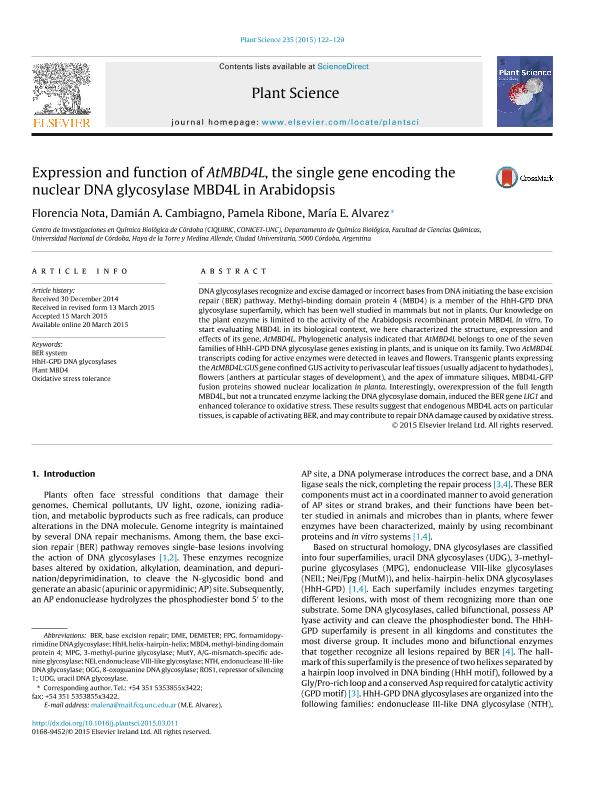Mostrar el registro sencillo del ítem
dc.contributor.author
Nota, María Florencia

dc.contributor.author
Cambiagno, Damián Alejandro

dc.contributor.author
Ribone, Pamela Anahí

dc.contributor.author
Alvarez, Maria Elena

dc.date.available
2016-12-29T18:33:38Z
dc.date.issued
2015-06
dc.identifier.citation
Nota, María Florencia; Cambiagno, Damián Alejandro; Ribone, Pamela Anahí; Alvarez, Maria Elena; Expression and function of AtMBD4L, the single gene encoding the nuclear DNA glycosylase MBD4L in Arabidopsis; Elsevier Ireland; Plant Science; 235; 6-2015; 122-129
dc.identifier.issn
0168-9452
dc.identifier.uri
http://hdl.handle.net/11336/10623
dc.description.abstract
DNA glycosylases recognize and excise damaged or incorrect bases from DNA initiating the base excision repair (BER) pathway. Methyl-binding domain protein 4 (MBD4) is a member of the HhH-GPD DNA glycosylase superfamily, which has been well studied in mammals but not in plants. Our knowledge on the plant enzyme is limited to the activity of the Arabidopsis recombinant protein MBD4L in vitro. To start evaluating MBD4L in its biological context, we here characterized the structure, expression and effects of its gene, AtMBD4L. Phylogenetic analysis indicated that AtMBD4L belongs to one of the seven families of HhH-GPD DNA glycosylase genes existing in plants, and is unique on its family. Two AtMBD4L transcripts coding for active enzymes were detected in leaves and flowers. Transgenic plants expressing the AtMBD4L:GUS gene confined GUS activity to perivascular leaftissues (usually adjacentto hydathodes), flowers (anthers at particular stages of development), and the apex of immature siliques. MBD4L-GFP fusion proteins showed nuclear localization in planta. Interestingly, overexpression of the full length MBD4L, but not a truncated enzyme lacking the DNA glycosylase domain, induced the BER gene LIG1 and enhanced tolerance to oxidative stress. These results suggest that endogenous MBD4L acts on particular tissues, is capable of activating BER, and may contribute to repair DNA damage caused by oxidative stress.
dc.format
application/pdf
dc.language.iso
eng
dc.publisher
Elsevier Ireland

dc.rights
info:eu-repo/semantics/openAccess
dc.rights.uri
https://creativecommons.org/licenses/by-nc-nd/2.5/ar/
dc.subject
Ber System
dc.subject
Hhh-Gpd Dna Glycosylases
dc.subject
Plant Mbd4
dc.subject
Oxidative Stress Tolerance
dc.subject.classification
Bioquímica y Biología Molecular

dc.subject.classification
Ciencias Biológicas

dc.subject.classification
CIENCIAS NATURALES Y EXACTAS

dc.title
Expression and function of AtMBD4L, the single gene encoding the nuclear DNA glycosylase MBD4L in Arabidopsis
dc.type
info:eu-repo/semantics/article
dc.type
info:ar-repo/semantics/artículo
dc.type
info:eu-repo/semantics/publishedVersion
dc.date.updated
2016-12-28T17:55:08Z
dc.journal.volume
235
dc.journal.pagination
122-129
dc.journal.pais
Irlanda

dc.description.fil
Fil: Nota, María Florencia. Consejo Nacional de Investigaciones Científicas y Técnicas. Centro Científico Tecnológico Córdoba. Centro de Investigaciones En Química Biológica de Córdoba (p); Argentina. Universidad Nacional de Córdoba. Facultad de Ciencias Químicas. Departamento de Quimica Biológica; Argentina
dc.description.fil
Fil: Cambiagno, Damián Alejandro. Consejo Nacional de Investigaciones Científicas y Técnicas. Centro Científico Tecnológico Córdoba. Centro de Investigaciones En Química Biológica de Córdoba (p); Argentina. Universidad Nacional de Córdoba. Facultad de Ciencias Químicas. Departamento de Quimica Biológica; Argentina
dc.description.fil
Fil: Ribone, Pamela Anahí. Consejo Nacional de Investigaciones Científicas y Técnicas. Centro Científico Tecnológico Córdoba. Centro de Investigaciones En Química Biológica de Córdoba (p); Argentina. Universidad Nacional de Córdoba. Facultad de Ciencias Químicas. Departamento de Quimica Biológica; Argentina
dc.description.fil
Fil: Alvarez, Maria Elena. Consejo Nacional de Investigaciones Científicas y Técnicas. Centro Científico Tecnológico Córdoba. Centro de Investigaciones En Química Biológica de Córdoba (p); Argentina. Universidad Nacional de Córdoba. Facultad de Ciencias Químicas. Departamento de Quimica Biológica; Argentina
dc.journal.title
Plant Science

dc.relation.alternativeid
info:eu-repo/semantics/altIdentifier/doi/http://dx.doi.org/10.1016/j.plantsci.2015.03.011
dc.relation.alternativeid
info:eu-repo/semantics/altIdentifier/url/http://www.sciencedirect.com/science/article/pii/S0168945215000813
Archivos asociados
